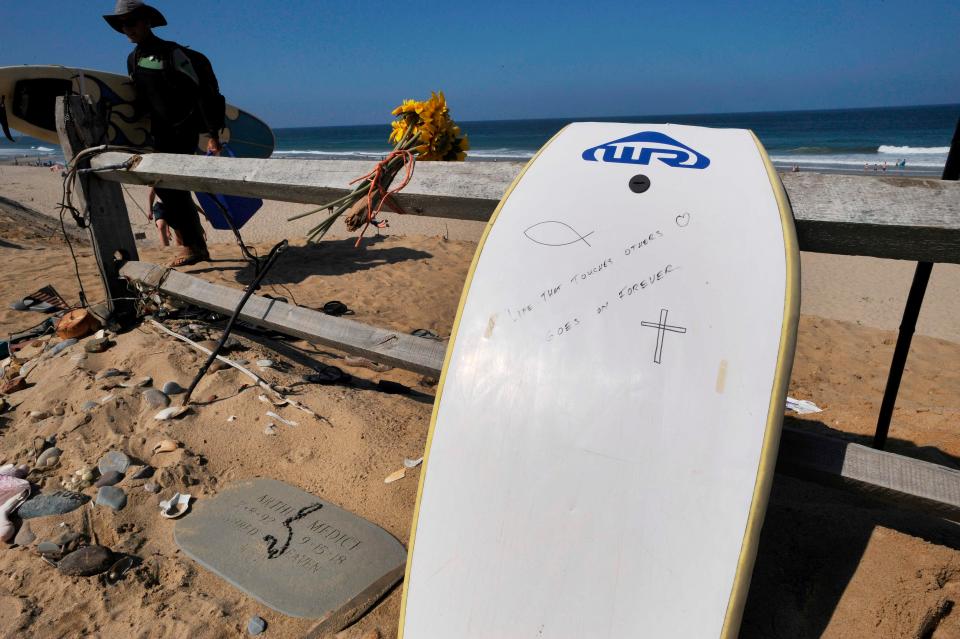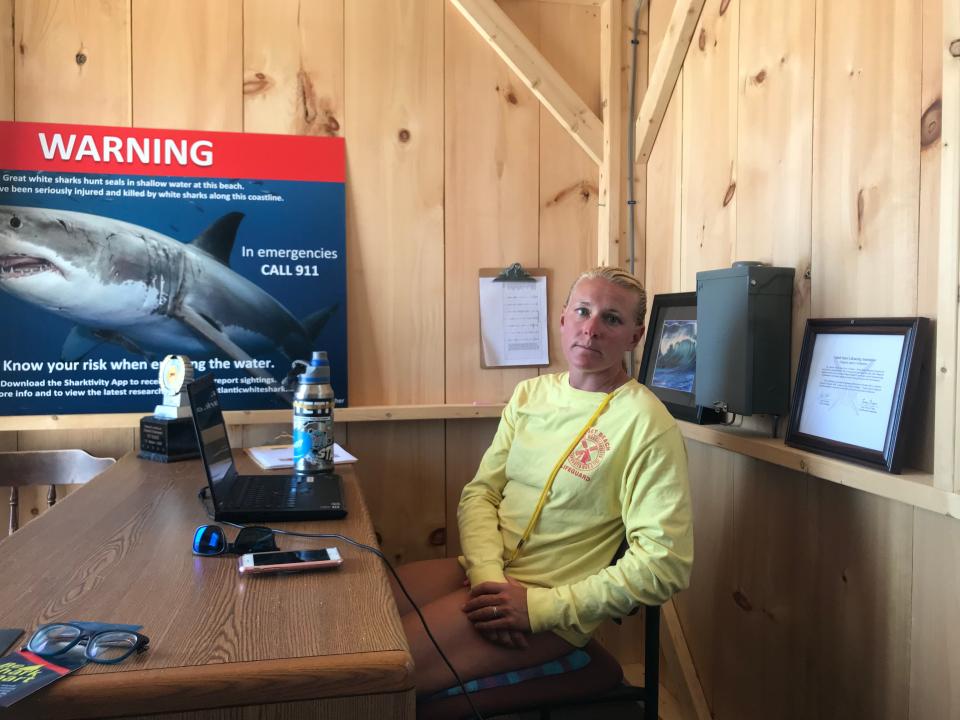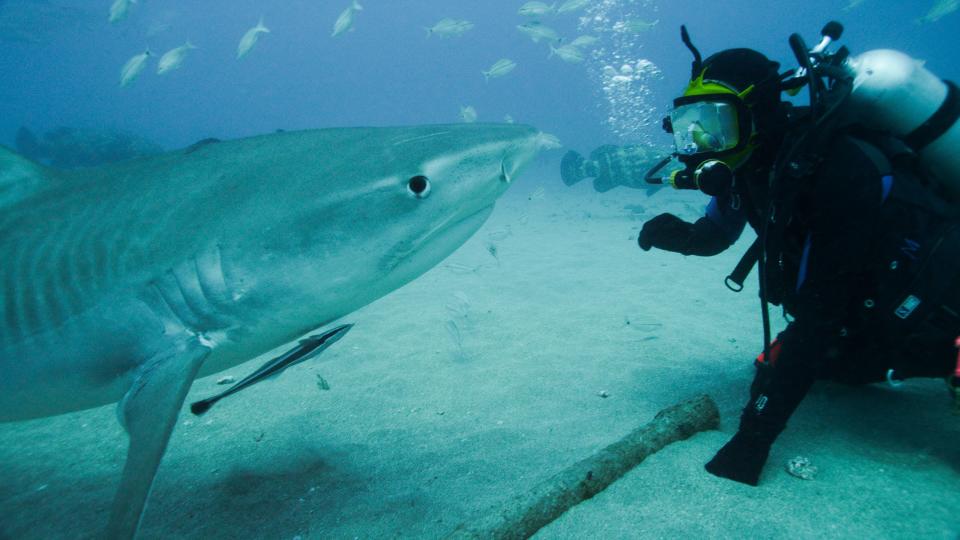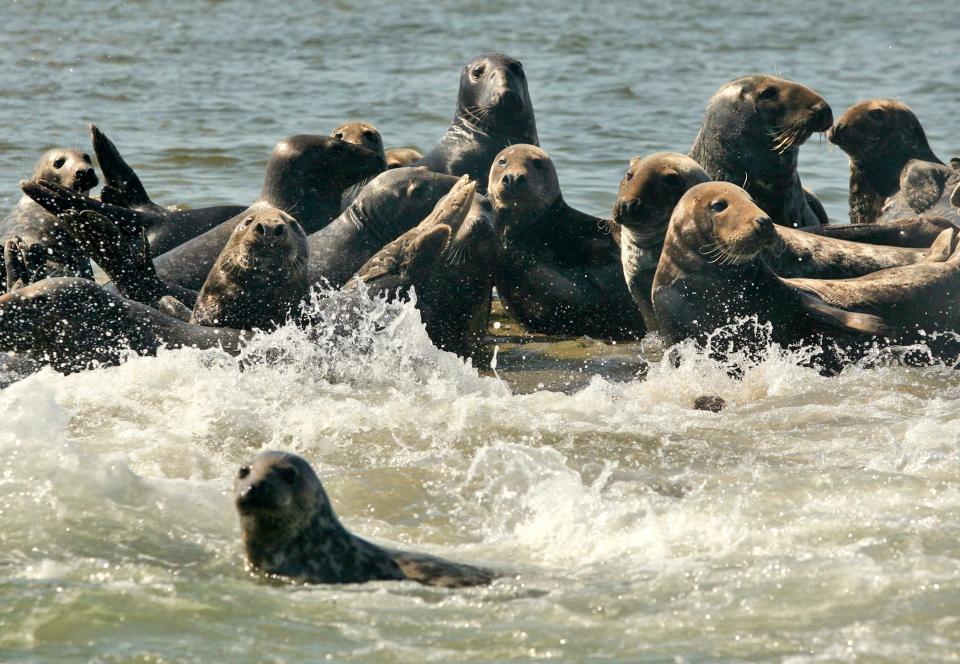Sharks have multiplied off Cape Cod beaches, devouring gray seals and putting swimmers on edge
ORLEANS, Mass. — It's 11:30 a.m. on a sticky August morning at Nauset Beach here in this Cape Cod town, when another call comes in on the walkie-talkie of Sarah Newcomb- Baker, the beach's head lifeguard.
The voice is one of her employees flagging a scene similar to the one spotted just two hours before: a great white shark attacking a seal off the shore.
Another lifeguard buzzes in saying she saw a large splash in the area earlier: "I'm wondering if that's the same thing."
Minutes later, Nauset Beach announced its second shark evacuation just that morning, forcing beach-goers to get out of the water for the next hour. The previous closure happened at 9:45 a.m. after a lifeguard spotted a shark devouring a seal about 100 feet off the coast on a different wing of the beach.
Shark-sightings have been a regular occurrence this summer on the sandy beaches that dot Cape Cod, a popular vacation hub of New England. Brochures distributed on beaches urge visitors to "Be shark smart." Signs warn, "Know your risk when entering the water." Following the back-to-back sightings this day, Nauset Beach has purple shark flags erected throughout. It means that sharks are in the area.
Sharks have long been tied to the folklore of Cape Cod thanks to the Steven Spielberg movie classic "Jaws," filmed at Martha's Vineyard in 1975. But spotting a shark had for decades been rare until recently.
"Never even thought about it," said Newcomb- Baker, recalling her start as a lifeguard on Cape Cod for 22 years ago.

Now sharks – namely great white sharks that can range between 6-feet and 18-feet long – are part of the everyday beach life. They've congregated here in pursuit of dinner in the form of gray seals, which have repopulated in Cape Cod after a federal prohibition on hunting seals was enacted a half-century ago.
The sharks swim up from the south Atlantic Ocean and elsewhere each year in May and June with more appearing each month. They will largely leave when the waters cool in the fall.
"The ocean is changing so we're going to have to change our behaviors as well," Newcomb-Baker said. A beach policy prohibits swimmers from drifting off into water deeper than the waist. "We're way more strict this year."

First anniversary of fatal shark attack
Sharks started popping up more frequently off Cape Cod about a decade ago, but the activity has picked up more in the last five to seven years.
The key moment was the death of 26-year-old Arthur Medici, who on Sept. 15, 2018, became the first person killed by a shark attack off Cape Cod since 1936. Medici was boogey-boarding off Newcomb Hollow Beach in Wellfleet, Massachusetts, when the attack occurred. His family was on the beach when it happened.

"That has definitely strengthened us as a unit, us as a town, along with the seashore," Newcomb- Baker said.
The fatal shark attack came just weeks after William Lytton, a then-61-year-old neurologist from Scarsdale, New York, was bitten by a great white shark while swimming off Truro Beach on Aug. 15, 2018. He said he escaped by punching the shark aggressively as it bit into his left leg.
More: Suspected shark attack kills man in his 20s near Cape Cod, police say
This summer there have been no reported shark attacks, just a constant stream of alerts and videos posted on social media of close encounters. A family had a 16-foot shark brush against their boat in Provincetown. A charity swim had to be rerouted because of sharks. One great white shark sharked literally jumped out of the water to snag a child's fishing line.
High above the water, the Massachusetts State Police responded by sending more helicopters to patrol the coastline in search of sharks near the shore. "When we're up there, we have the ability to discern whether or not it's an actual threat," said Lt. Tom Ryan, a spokesman of the police department.

Researchers study sharks' eating habits to prevent the next attack
The comeback of the great white shark is tied directly to the resurgence of the seals, which have recognized the Northeast following the passage of the federal Marine Mammal Protection Act in 1972. The law sought to protect seals and other wildlife that on the verge of extinction from hunting.
Although an exact number is unclear, one recent estimate using Google Earth imagery had the gray seal population between 30,000 and 50,000.
"It's somewhat of a conservation success story, really," said Gregory Skomal, a marine fisheries biologist at the Massachusetts Division of Urban Fisheries.
Skomal is the leading shark expert in Cape Cod. Since 2009, he and a team of researchers have tagged shark to track their movement. More recently, in 2014, he's partnered with the nonprofit Atlantic White Shark Conservancy to figure out just how many sharks come to the region each year.
They've identified more than 350 great white sharks off Cape Cod and have tagged about 175 of them. This July they saw more sharks than last July.
Now, their work has a new focus – studying sharks' behavior as they prey on seals. Skomal and his researchers are using acoustic and satellite technology, while individually placing tags called "acceleration data loggers" on the sharks from boats. It's made available new behavior data about their eating habits.

The goal of the multi-year study: be able to forecast when and where sharks will attack seals next.
"We firmly believe that bites on people are mistakes. That's a shark thinking they are biting a seal," Skomal said. "If we can get a better understanding of the shark-seal relationship – where, when and how white sharks attack their prey – I think that we'll be able to provide beach managers and the general public with patterns that we will use to try to keep people safe."
More: Great white sharks: Cape Cod study to examine feeding habits following two attacks
Statistically, going to the beach in Cape Cod is safer than driving a car – but Skomal said something about sharks stick with people.
"The fear of shark attack, I think is profound. Although there are not many shark attacks locally and very few are fatal, people think about it. It impacts an area and people's psyche."
Group takes aim at gray seals
Although some observers wonder whether warmer waters have attracted sharks to Cape Cod, Skomal said there's no evidence yet to conclude climate change has played a role.
The increase in sharks has added to an existing debate about seals in Cape Cod. Commercial and recreational fishers blame the growing number of seals in recent decades for already decimating a once-thriving fishing industry. Now, they say, the seals have brought unwanted sharks to beaches.
A new group, started by residents of Nantucket island, dubbed the Coalition to Amend the Marine Mammal Protection Act, is pushing to change the law to allow gray seals, which can weigh more than 800 pounds, to be hunted again.

The coalition, led by Peter Howell, a recreational fisherman and a director of the Atlantic Salmon Federation, is lobbying to create a new provision in the law for removing species like gray seals that have been recovered and a separate provision to ensure they remain. It would require action by Congress.
"We certainly acknowledge that the Marine Mammal Protection Act has been a great help and, as far as gray seals are concerned, a great success," Howell said. "We just think it was short-sighted in providing for what happens when in fact a species has recovered."
States do have the right to assume control over a species under the law if it has reached an "optimum sustainable population." But Howell said threshold is unattainable because no one really knows how many seals are on the Massachusetts coast. He said he has nothing against seals or sharks, but believes there just needs to be a better "balance."
The coalition has evolved from the Seal Action Committee, led by friend Peter Krogh, a former dean at Georgetown University who resides in Nantucket. Krogh and Howell tell stories about bait shops on Cape Cod that have shut down and the once-iconic fishing spot, Great Point, now taken over by seals. It's not uncommon to start reeling in a fish, they say, only to have it yanked by a seal.
"These are the consequences, and now people are afraid to go into the water – surfers, swimmers, you name it," Krogh said. "There's more protections for gray seals than there are for humans. It's just absolutely crazy."
But scientists warn that getting rid of gray seals isn't so simple, arguing that seals, in fact, haven't reached their saturation point in Cape Cod."it is his beat"
Sharon Young, senior strategist for marine issues for the Humane Society of the United States, said the fact that seals are reproducing at a high rate means they've not hit their carrying capacity. Reproduction rates tends to slow down when a species has reached their limit.
"'Enough' is not a concept in biology," she said. "The environment has a fairly clear number that it will tolerate, (even if) our social tolerance may have been exceeded."
She accused the group of not being up front about what their real intent – killing seals: "They don't like to say things like cull."
And even if seals were hunted again, Young said they would keep coming back.
"Unless we are proposing to kill literally hundreds and thousands of seals, which is what we did back in the day, you can't kill your way out of this. So it's a little bit naive to say we're going to take them off the Marine Mammal Protection Act."
Tourism down, but are sharks to blame?
Tourism is down slightly this year on Cape Cod, with rentals decreasing by about 5 percent during the first half of 2019 from the year before. But Wendy Northcross, CEO of the Cape Cod Chamber of Commerce, said she wants to review figures from the rest of the summer and fall before she determines if there's a larger trend.
She believes sharks might just be one of several reasons to explain the soft market, noting that the dip coincides with a drop nationally in domestic tourism.
"I think there's a lot of things at play here and sharks might be one tiny little bit of it," Northcross said.
The chamber conducted focus group this spring which concluded that traditional Cape Cod visitors would return knowing about the presence of sharks. Northcross said beach-goers are practicing better safety habits this year. Some tourists even inquire about the best place to see sharks.
At Nauset Beach, beach-goers don't seem to mind even after back-to-back shark closures.
"For us, it's not impacted our decision to come to the Cape during the summer," said Joe Bradley, of Newton, Massachusetts, who made his annual trip down his wife and two daughters, ages 12 and 9. "It's just a little bit of an added frustration."
He jokes that he tells his daughters, "Try and catch the seals. That way there's no sharks," Kidding aside, he said his family is "very conscientious" about whether flags are up and how far their kids are from the shoreline.
Young, who is based in Cape Cod with the Human Society, said beaches in Hawaii, California and Florida, have remained popular despite having hotbeds of sharks and even an occasional attack. People there know to be smart about where they go and how they behave, she said.
"We're just not used to that mindset here. But we need to remember that just because it's new here doesn't mean it is unique.
She added: "The return of seals and sharks is a sign that the ocean is trying to correct itself for some grotesque mismanagement on our part. We just need to think about a new normal."
Reach Joey Garrison on Twitter @Joeygarrison.
This article originally appeared on USA TODAY: Cape Cod shark sightings up, prompting more beach evacuations


